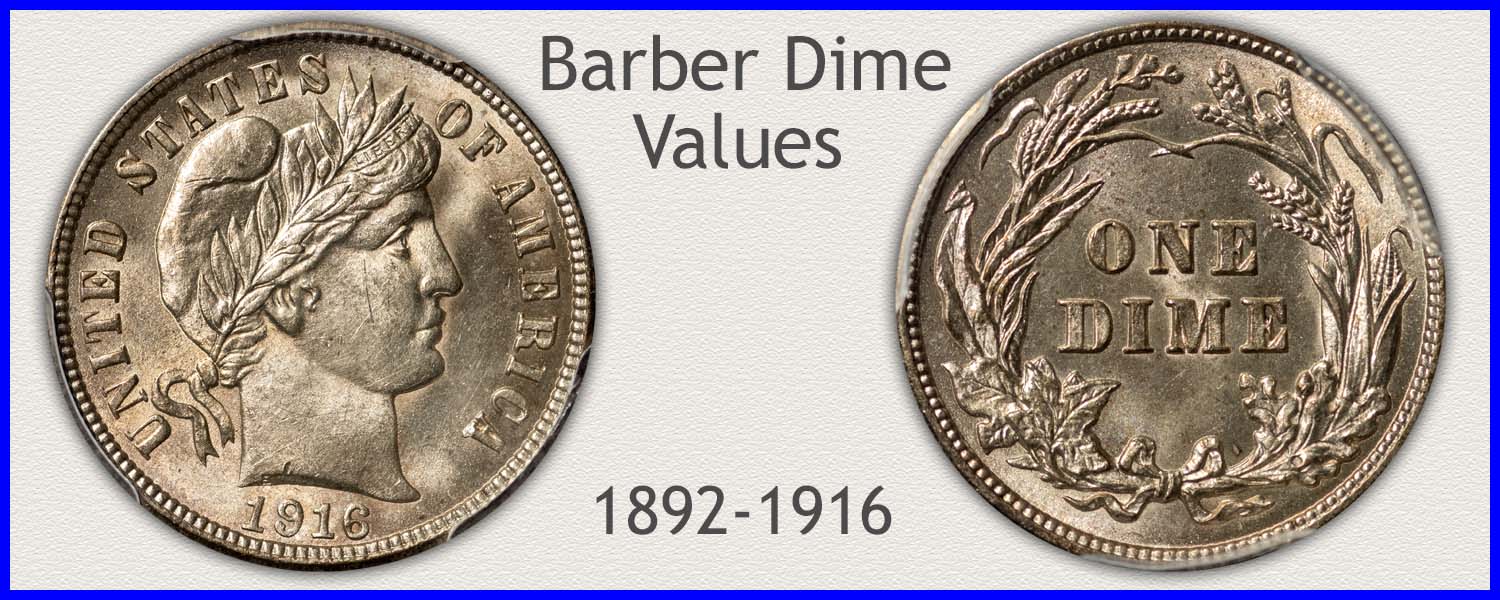Coin Values Moving with Precious Metals: Up-Dated 4/14/2025: Gold $3226 | Silver $31.88
1912 Dime Value
90% silver content by weight is a base to the minimum 1912 dime value. Barber coinage is an older vintage series and this minimum includes a small premium because of their obsolete series status.
Barber dime coinage starts with a worth of $4.05 each. Currently, on 4/14/2025 , silver is in the range of $31.88 per ounce.
Collectible qualities are determined next. Specific date and mint combinations are sought by collectors, placing additional premiums on the difficult to find mint issues.
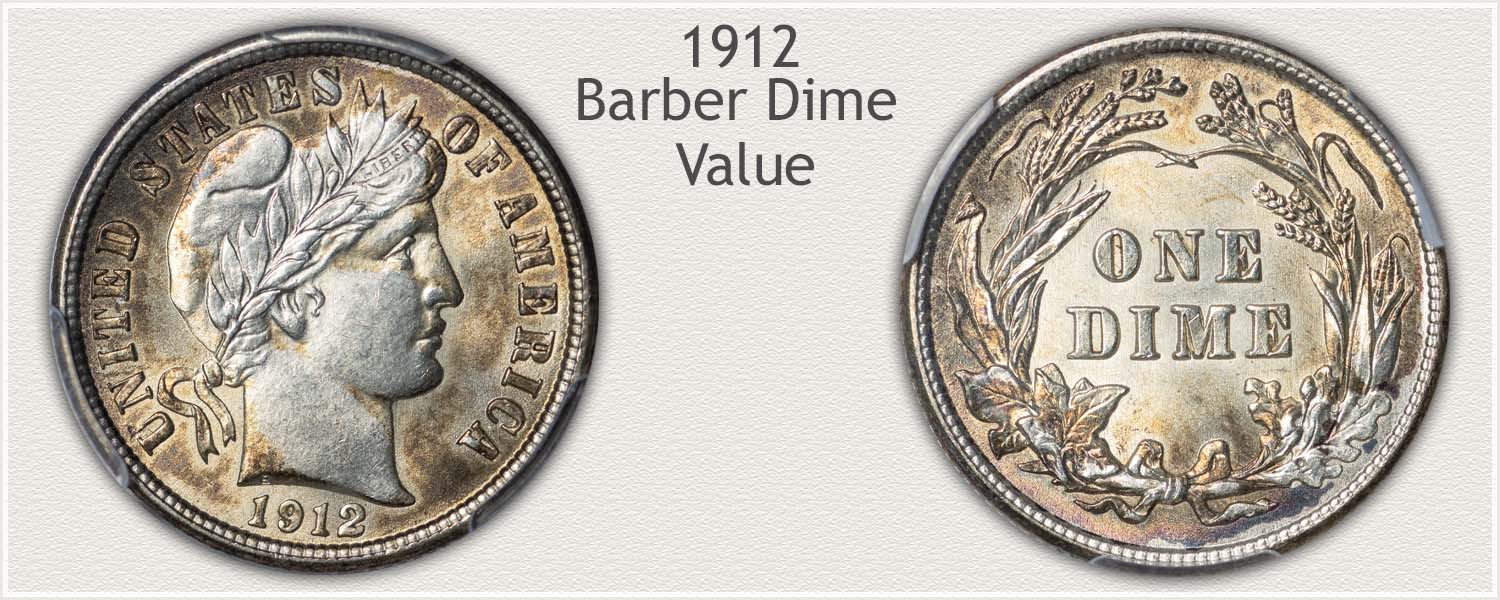
Steps Leading to Value:
- Step 1: Date and Mintmark Variety - A complete set of Barber dimes includes all the different mint varieties for each year. For each issue, the values are listed. Inspect and verify the mint striking your coin.
- Step 2: Grading Condition - Coins considered as potential collectibles are judged by their condition. Moreover, each coin is assigned a grade to locate its position on the value chart.
- Step 3: Special Qualities - An overview to quality of these Barber dimes follows. Coins are premium valued by collectors when they do not have any distracting marks, nicks ore mishandling.
| 1912 Dime Value | ||||
|---|---|---|---|---|
| Condition of Coin | ||||
| Date | Good | Fine | Extremely Fine | Mint State |
| Barber Dime Values Updated | 4/14/2025 | |||
| 1912 | $4.05 | $4.72 | $21 | $115 |
| 1912 D | $4.05 | $4.72 | $21 | $110 |
| 1912 S | $4.05 | $7.64 | $41 | $166 |
Listed is a range a collector would sell Barber dimes to a dealer. Use as a guide.
Step 1: | Date and Mint Issue Identified
Three Varieties of 1912 Dimes to Recognize and Record
Collectors today seek examples of each different mint issue of 1912 dimes as part of a Barber series collection. A year of multi-million pieces struck by three different mints; these coins are abundant in well-worn condition.
To identify production from the mints, small letters used as mintmarks were placed on Branch mint coinage. These marks plus the date are the different listings on the above chart.
Low condition, heavily worn coins are common, collectors are placing a premium on better condition examples. Record date and mint and then continue and grade condition in Step 2 to narrow the value range.
1912-S Barber Dime
"S" Mintmark on Reverse: San Francisco Mint Struck the Coin
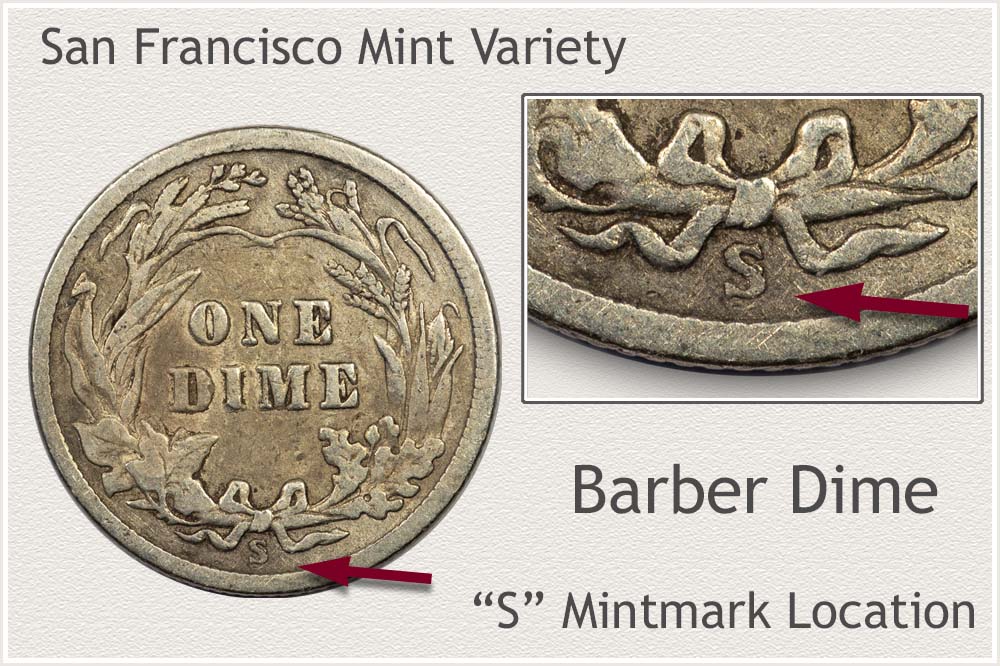
All San Francisco mint dimes minted in 1912 are a candidate for a premium when highly detailed. Moderate to heavily worn examples are valued close to their silver content. Coinage from the western branch mint has become a popular choice among coin collectors. Notability, it's difficult to locate well-detailed examples for their Barber dime sets. Over 3.4 million were produced, an ample supply for commerce at the time. However, today, there are few of high quality worth a premium as a collectible.
Coins minted at San Francisco bear an "S" mintmark on the reverse. The mintmark is a prominent "S" placed at the lower rim, just under the bow.
1912-D Barber Dime
"D" Mintmark on Reverse: Denver Mint Struck the Coin
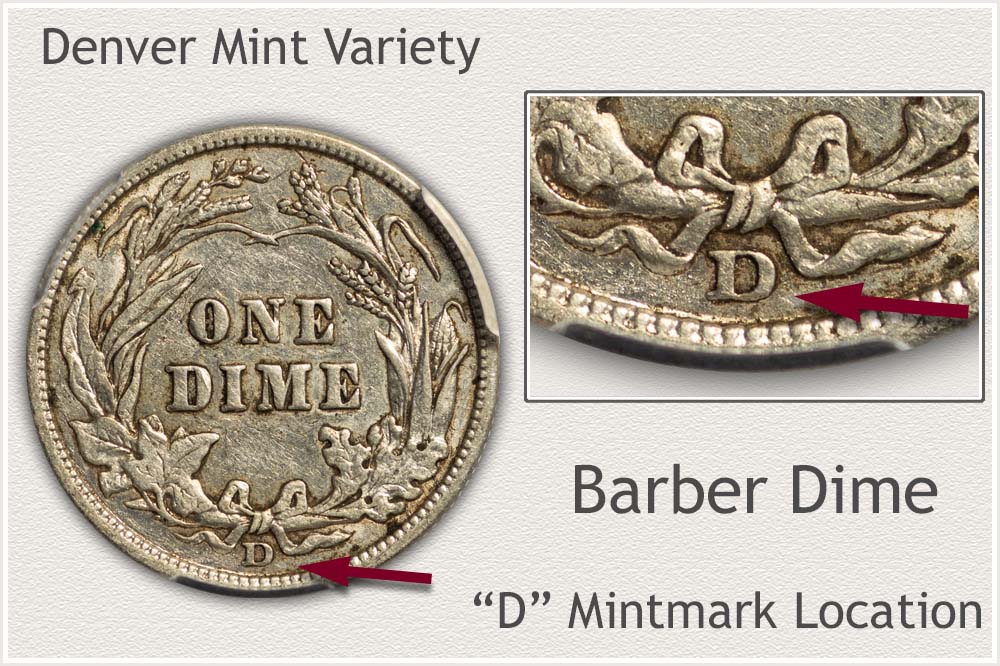
All 1912 dimes produced at the Denver mint have a basic value supported by their silver content. With a very large number struck, over 11.7 million, they are abundant today. A challenge faced by collectors, is finding lightly worn or better examples to add to their collections. It is this demand supporting the premium values found on the chart for conditions in Extremely Fine grade.
Denver coinage is identified by the "D" mintmark found on the reverse of the coin. At the lower rim, in the area just below the wreath, is the large "D" mark, confirming the Denver variety.
1912 Barber Dime
No Mintmark on Reverse: Philadelphia Mint Struck the Coin
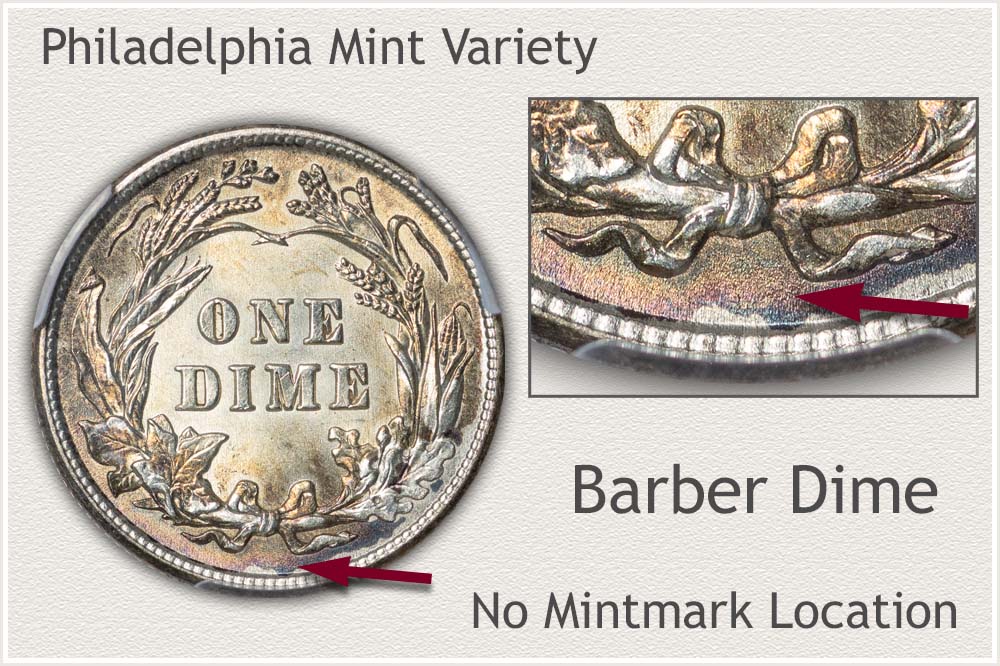
The Philadelphia mint continued its production of an above average amount of dimes in 1912. Over 19 million placed into circulation. These are available in large quantities, enough to meet collectors' needs today. Typical quality, worn specimens are priced close the silver's intrinsic value. In Step 2, grading condition identifies better condition coins.
To confirm the issue, Philadelphia did not use mintmarks during the Barber series. Inspecting the reverse, if the space between the ribbon ends of the bow is blank, Philadelphia struck the dime.
Step 2: | Judge Condition Finding Premium 1912 Dime Value
Collectible Quality Found When Condition is Graded
Collectors appreciate eye appeal of an old Barber dime. A lightly worn or better, well-preserved coin is sought and valued. Grading the condition of these coins finds its place on the chart. Grades are determined by comparing to standards representing stages of wear.
Ensure your coin matches the images and descriptions of grades helping narrow it premium. It's the small details pointing to high end dimes.
Mint State Grade
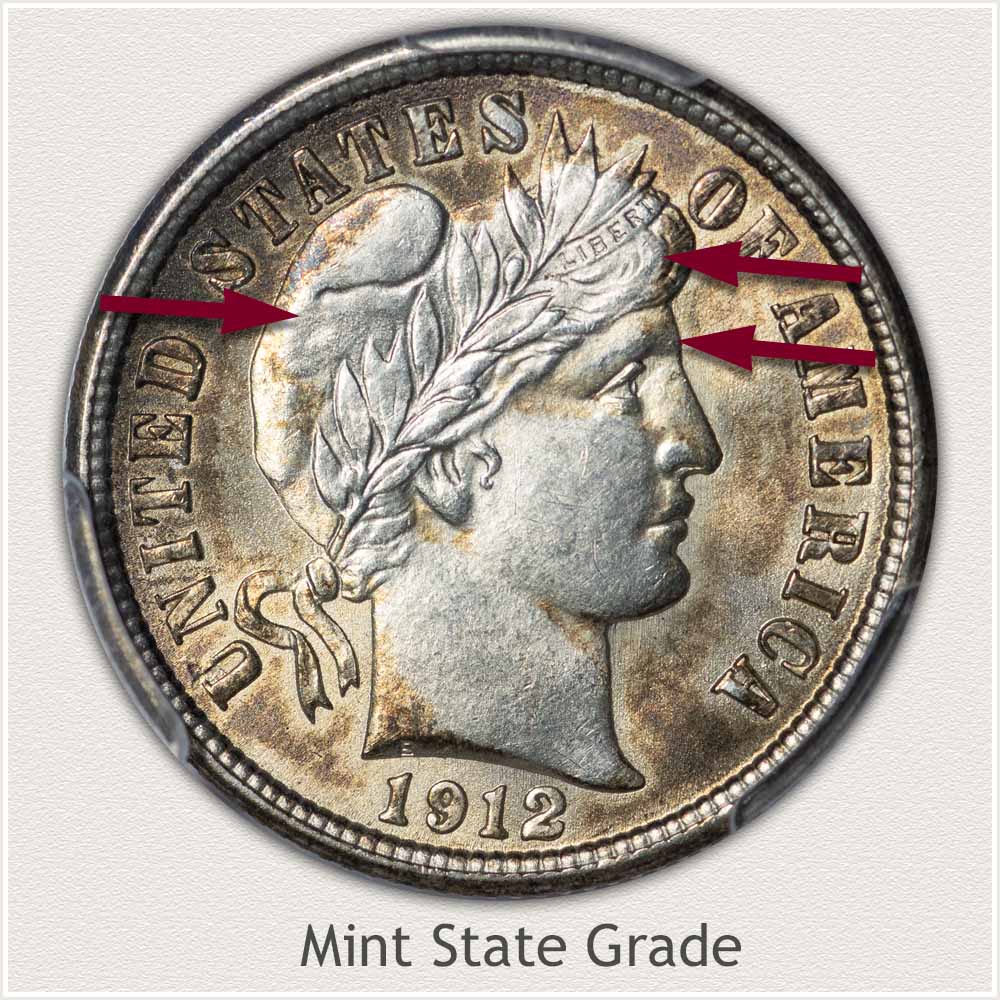
Mint State: A dime in mint state is one that has not been mis-handled or worn since it was minted. These collectible Barber dimes never circulated and show no surface wear. The most important definition of mint status is- no wear. The grade is confirmed by inspecting a few design features.
Liberty's eyebrow is one of the most important parts of the design to inspect. When examining the brow on the sample coin, it has a similar shine that is comparable to her cheek beneath the eye. A surface with remaining luster indicates that it has not been worn. Brilliance is lost when worn and replaced with smoothing to the metal, appearing a dull silver-grey.
Next, look at Liberty's hair above her forehead. The metal shines with luster on all strands of hair and the large wave. Tilting the coin in front of a light allows you to detect small color variations if the metal is worn. Overall appearance of a mint state dime is lustrous, crisp, and well-defined.
Extremely Fine Grade
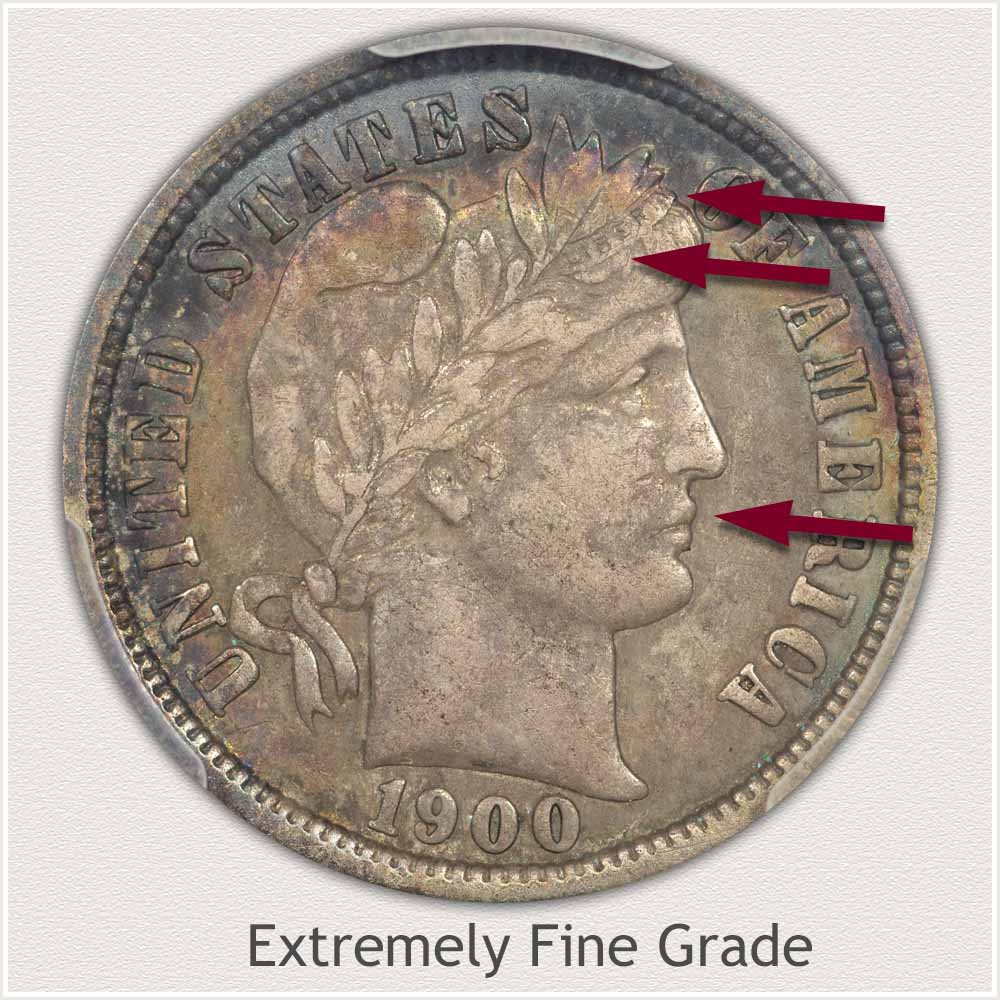
Extremely Fine: Identify a collectible-quality Barber dime by judging condition and looking for fine details. Light wear across the entire surface, located only on the extremely high reliefs, adds to the definition of the Extremely Fine condition and grade.
Appearance of a lightly circulated dime is the original shine replaced by a subtle silver-gray hue. Inspecting the headband, all of the letters on the headband to "Liberty" are plainly visible is a significant feature. The top and bottom edges of the headband are also distinct, indicating only light wear and Extremely Fine condition.
Liberty's portrait appears full and rounded from an overall view of the coin. High and low relief areas on her face are distinct. This is a crisply detailed coin.
Fine Grade
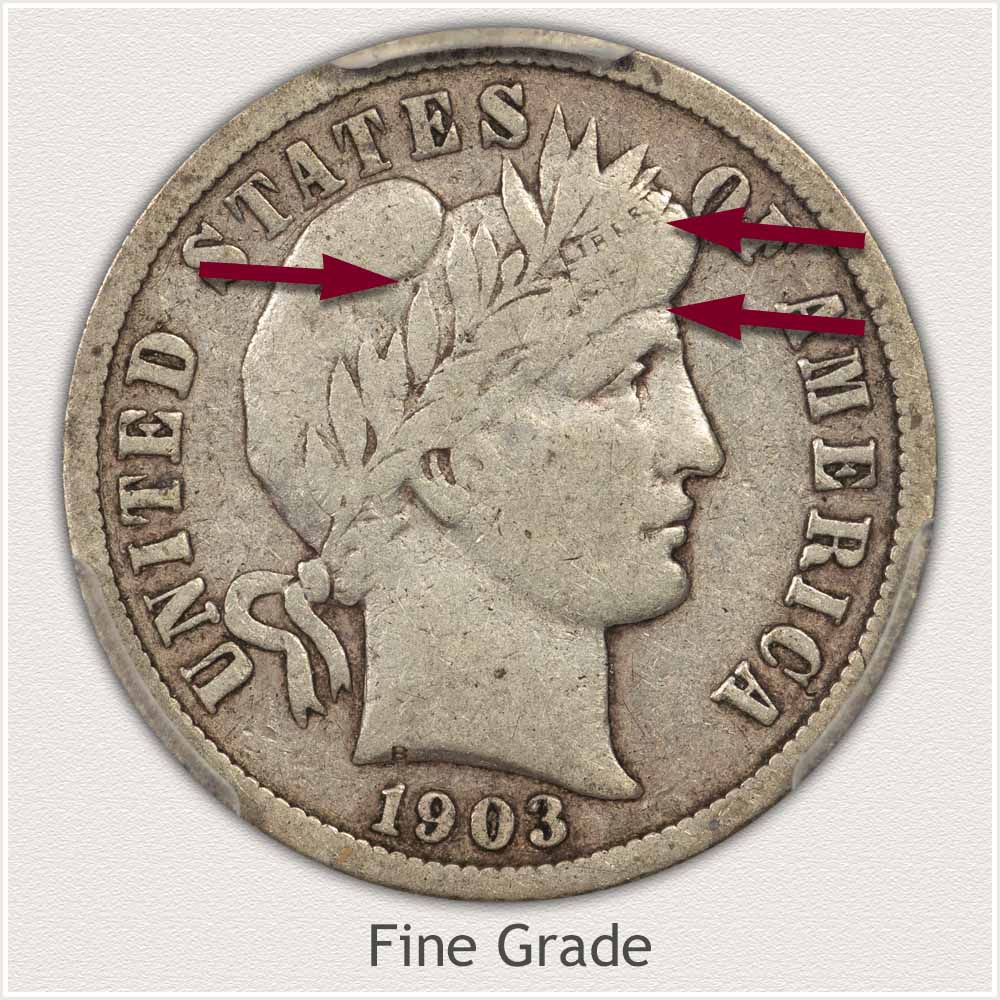
Fine Grade: With obvious signs of wear and some blending of design elements theses become indications of a moderately worn Barber dime. Coins with a few important elements visible are classified as Fine Grade. New and beginning collectors alike are interested in moderately worn Barber dimes as an affordable collectible. Detail on these coins is pleasing.
To recognize the grade, the first and most crucial feature is all letters of "Liberty" are visible within the headband, although "ER" is frequently faint. A coin's lettering is clearly visible in order for it to grade as Fine condition. The hairline on the forehead is also clearly defined by a thin line helping establish the condition.
The top row of laurel leaves is clearly defined, which adds a level of detail to the overall design. Each upward-pointing leaf edge is distinct from the Liberty cap.
When looking at the coin as a whole, there is still plenty of detail; excellent detail inside the laurel leaves, and separation of Liberty's chin, neck, and cap.
Good Grade
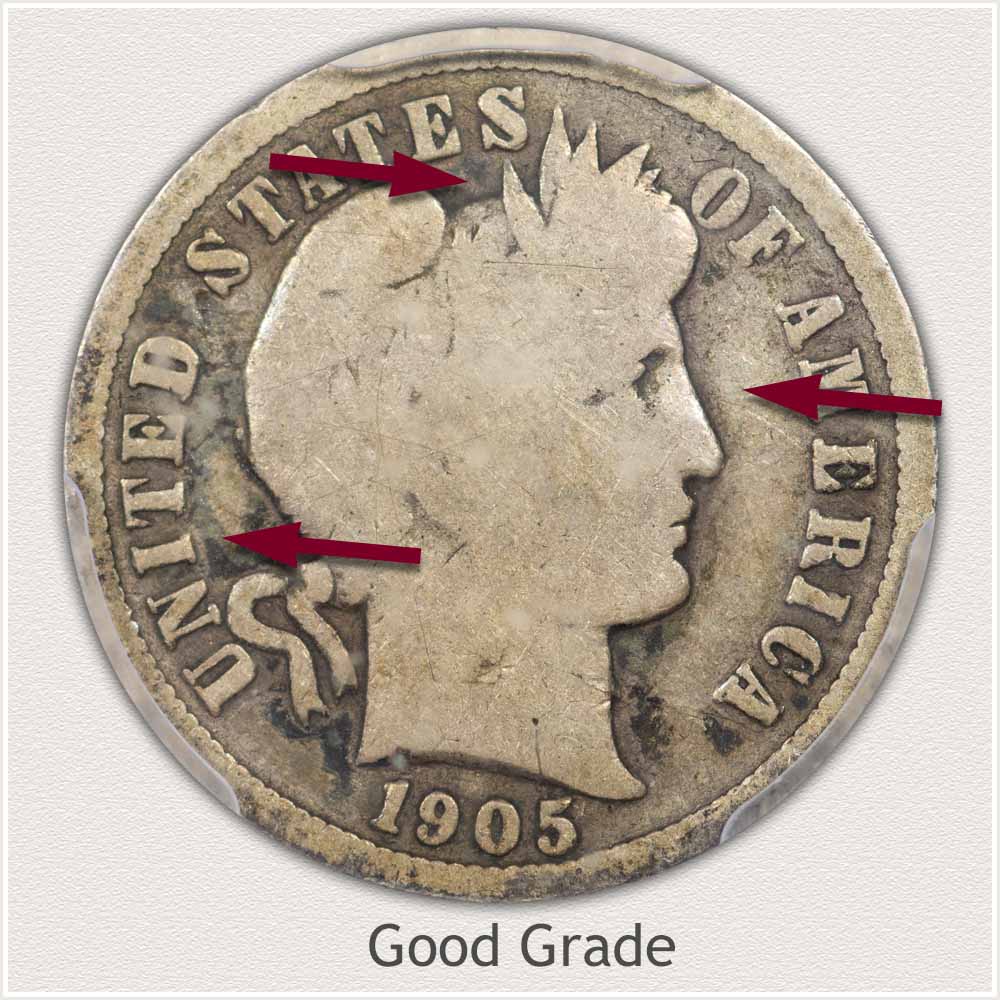
Good Grade: First impression of a Good grade Barber dime is lack of detail within the central area of the coin. These coins are defined as heavily worn with major details missing.
Liberty's portrait must remain well outlined and her eye area visible. Although Liberty is worn very smooth, a few centrally located devices are sometimes evident. To consider it for a good grade, one important feature is that the portrait remains bold from the coin's field.
Giving the condition a certain appeal is the full rim and clear separation of the rim from lettering. Additionally, all letters along the rim are fully readable. With a bold date remaining, a Barber dime matching the image is a Good grade coin.
How to Video: Grading Barber Dimes
Grading is expanded in greater detail covering the subtle points found in different conditions. Images highlight design details needed to determine a narrow grade range.
Video, Images and Descriptions | Grading Barber Dimes
Step 3: | Special Qualities | Remaining Original
Non-Cleaned Barber Dimes are Original Quality and Collectible
An important quality to any collectible coin is originality of surfaces. The coin preferably remains as it was when removed from circulation or collected early in mint state condition. These coins in an original state of preservation display very subtle toning and various shades of tans and greys. Eye appeal and aesthetics are part of value.
One easily recognized damage is when a coin is cleaned. Very often a coin is "cleaned" to "improve" its appearance. Many coins today from the Barber dime series show evidence of cleaning.
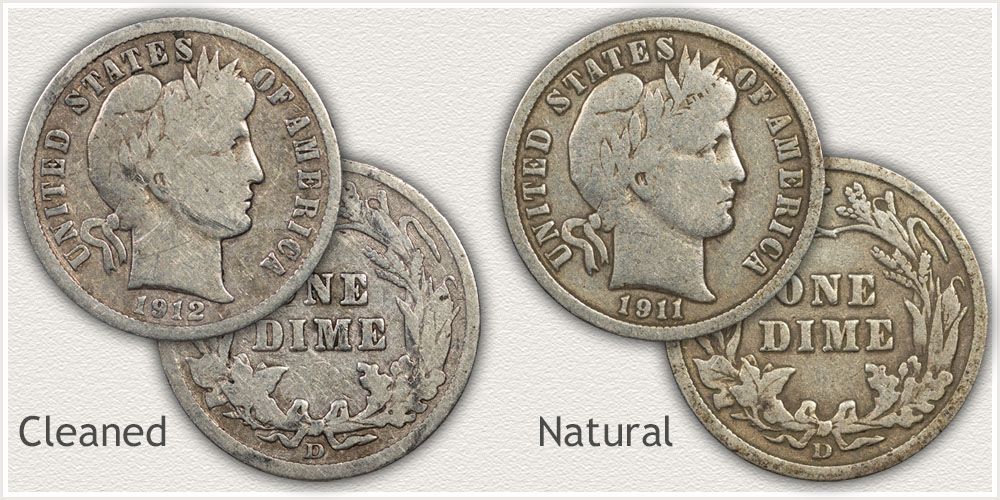
It is noticeable in the example coin the surfaces are unnatural in appearance and quality. A shine and brightness to the surface is the overall look of the coin. When compared to a natural quality example, the clean coin does not show the subtle blending of color shades. Fields of the cleaned coin are the same appearance as raised devices and all are monotone.
Inspect your coin for original toning and natural surfaces. Cleaned coins are lowered in value and often reduced to base silver worth. Cleaning a coin always removes the coin from consideration by a collector.
References
U.S. Mint. 1913 U.S. Mint Annual Report https://nnp.wustl.edu/library/book/514126
Coin Values | CoinStudy Articles
Date by Date
In Depth Barber Dime Values
1892 to 1916
Barber Dime Value | Identify Their Potential Worth
Barber dimes have now become an older series with many date and mint combinations worth well above base silver value. Each is $4.05 because of their 90% silver alloy. Many have low mintage numbers, are scarce and collected in all conditions with strong premiums.
Picture Index of U.S Coin Series | Old Coin Value Charts
Value charts of the different U.S. coin series. Images identify denomination and series. Each follows a value process to determines how much they are worth.
Print the Coin Values Worksheet
Record your collection of old coins in one place. The value sheet organizes the listing of coins, keeping a summary of values. Complete Barber dimes and continue with the rest of your holdings.
Sell Silver Coins | Identify Market and Coin
There is a large market for older silver alloy U.S. coinage. These silver dimes, quarters, half and silver dollars are worth many times face value. Using the calculator determine today's price of each. Review the listing of dealers to find buyers of silver coins.
★Coin Values Discovery finds 1912 Dime Value and...
A review of the value process with image links to series and current coin value. Determining how much a collection of coins is worth follows a few steps helped by images and detailed descriptions.
